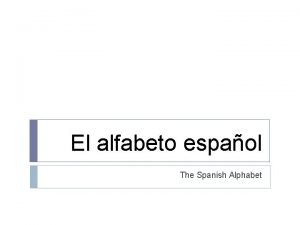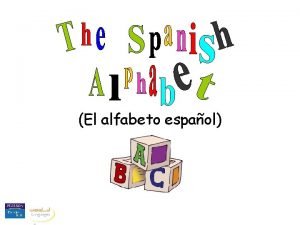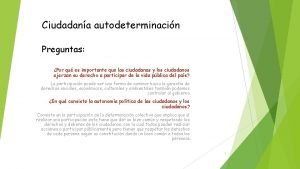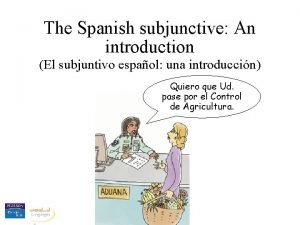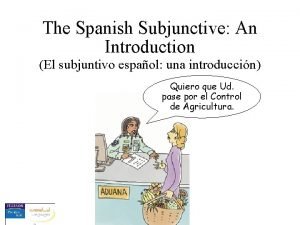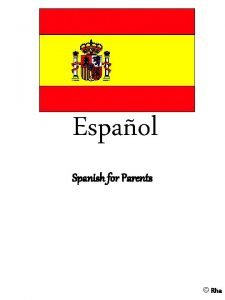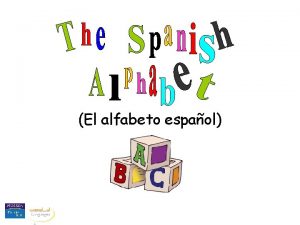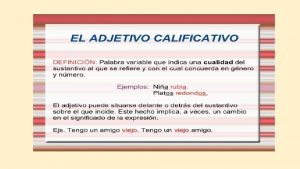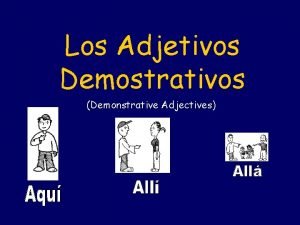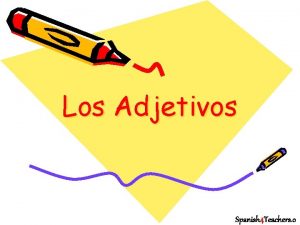Los adjetivos en espaol Adjectives in Spanish Adjectives

















- Slides: 17

Los adjetivos en español Adjectives in Spanish

Adjectives are words that describe people, places, and things. In Spanish, descriptive adjectives are used with the verb ser to point out characteristics Such as nationality, size, color, shape, personality, and appearance.

Descriptive adjectives agree in gender and/or number with the nouns or pronouns they. describe. • Javier es simpático. • Elena es simpatica. • Ellos son simpaticos.

The adjectives that end in -o have four different forms. The feminine singular is formed by changing the -o to -a. The plural is formed by adding –s to the singular forms. Masculine Singular: El muchacho alto Plural: Los muchachos altos Feminine Singular: La muchacha alta Plural: Las muchachas altas

Adjectives that end in –e or a consonant have the same masculine and feminine forms. Masculine Feminine Singular: el chico inteligente el examen difícil Singular: la chica inteligente la clase difícil Plural: Los chicos inteligentes Los exámenes difíciles Plural: las chicas inteligentes las clases difíciles

Adjectives that end in –or are variables in both gender and number. Masculine Singular: el hombre trabajador Plural: los hombres trabajadores. Feminine Singular: la mujer trabajadora Plural: las mujeres trabajadoras.

Use the masculine plural form to refer to groups that include males and females. Manuel es alto. Lola es alta. Manuel y Lola son altos.

Common Adjectives Alto/a Feo/a Inteligente Malo/a Interesante Gordo/a Grande Guapo/a Mucho Antipático/a Simpático/a Bonito/a

Adjectives of nationality Unlike in English, Spanish adjectives of nationality are not capitalized.

alemán, alemana argentino/a español/a estadounidense francés/francesa italiano/a mexicano/mexicanadiense

Adjectives of nationality are formed like other descriptive adjectives. Those that end in -o change to –a when forming the feminine. chino china mexicano mexicana * The plural is formed by adding an –s to the masculine or feminine form. argentinos cubana cabanas

Adjectives of nationality that end in –e have only two forms, singular and plural. canadienses estadounidenses

To form the feminine of adjectives of nationality that end in a consonant, add –a. alemán alemana japonés japonesa española Ingles inglesa

Position of adjectives Descriptive adjectives and adjectives of nationality generally follow the nouns they modify La mujer española habla inglés.

Unlike descriptive adjectives, adjectives of quantity precede the modified noun. Hay muchos libros en la biblioteca. Hablo con dos turistas puertorriqueños.

Bueno/a and malo/a can appear before or after a noun. When placed before a masculine singular noun, the forms are shortened: bueno buen; malo mal. Joaquín es un buen amigo. Joaquín es un amigo bueno. Hoy es un mal día. Hoy es un día malo.

When grande appears before a singular noun, it is shortened to gran, and the meaning of the word changes: gran=great and grande = big, large. Don Francisco es un gran hombre. La familia de Inés es grande.
 Los adjetivos y pronombres demostrativos
Los adjetivos y pronombres demostrativos Abecedario español
Abecedario español En espaol
En espaol Complete spanish alphabet
Complete spanish alphabet Abecedario espaol
Abecedario espaol Preguntas de ciudadania en espaol
Preguntas de ciudadania en espaol Examen de ciudadana 2020 en espaol
Examen de ciudadana 2020 en espaol Trabajos en espaol birmingham
Trabajos en espaol birmingham Miguel hidalgo preguntas
Miguel hidalgo preguntas Preparatic
Preparatic Preguntas para la ciudadana en espaol
Preguntas para la ciudadana en espaol Citizenship test en espaol
Citizenship test en espaol Espaol
Espaol Escapaa
Escapaa Norte sur este oeste mapa españa
Norte sur este oeste mapa españa Vowel + y
Vowel + y Espaol
Espaol Codigo penal espaol
Codigo penal espaol



